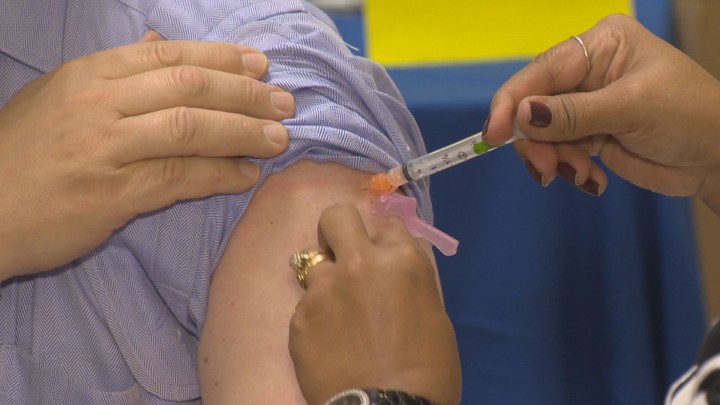SASKATOON – The province’s chief medical health officer says despite very few confirmed cases of influenza in the province over the last several months, health officials remain on alert. Sporadic cases have started to pop up in Saskatchewan and with colder weather settling in, numbers are expected to pick up.

Dr. Saqib Shahab says what has worked in our favour so far is our warmer than normal winter with less people congregating inside to get out of the cold.
During the 2013-14 flu season there were 1,590 confirmed cases of influenza with cases peaking in January according to numbers provided by the health ministry.
Skip to the last flu season and there were 1,452 cases with it hitting the hardest in late December, early January. In 2015-16 to date, there have been only 20 laboratory confirmed cases of influenza in the province so far.
The low numbers are much in line with the rest of the country and most parts of the United States.

Get weekly health news
“We’ve seen the usual coughs and colds over December but those are due to other respiratory viruses they’re not due to influenza.”
- Health Canada warns of fake semaglutide drugs, cites ‘product safety’ risks
- Virtual reality helping Peterborough seniors connect, experience the world
- Endometriosis care delays force Alberta woman to seek help abroad: ‘Just want my life back’
- Flu cases, hospitalizations continue to fall after 3-year peak over holiday
READ MORE: Separating fact from fiction when it comes to cures for the common cold
According to Shahab it’s not a matter of “if” the flu will strike but a matter of when.
“We have never see a winter without influenza but we do know that sometimes flu can come as early as October and sometimes it come as late as April/May.”
Last year, 606 people died across the country from the flu making it one of the deadliest on record.
Eight of those deaths were in Saskatchewan and there were 25 intensive care unit admissions related to the flu season, numbers believed to be under-reported based on 91 outbreaks in long-term care facilities.
This go-round, the province ordered 425,000 doses of the vaccine. According to Shahab, it’s estimated between 275,000 and 300,000 doses of the vaccine have been administered, less than the same time last year but it’s also proven to be more effective.
“The vaccine that we are using this year does show a better match for the strains that are circulating, the match for most people is at least 50 per cent protection which is much better than last year which was low as 26 per cent protection.”
With no shortage of vaccine this year, he urges everyone who hasn’t received their flu shot to get one while time is on their side.
“We always say the time to get the flu vaccine is in November and December but this year if for whatever reason you didn’t get it then you still have lots of time to get vaccine,” explained Shahab.
“Get protected in time for the flu season which we think is certainly going to come over the next six to eight weeks.”
Once the vaccine is given, it can take up to two weeks for maximum protection.









Comments